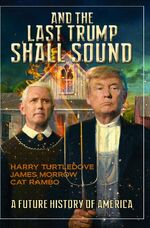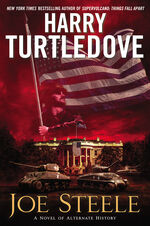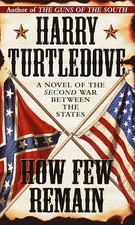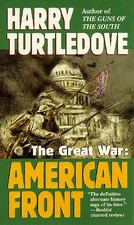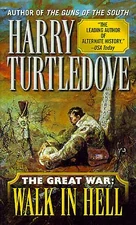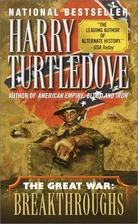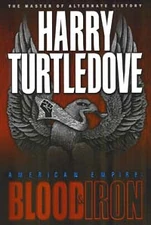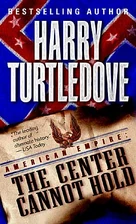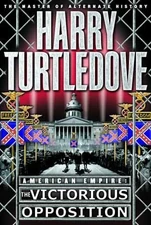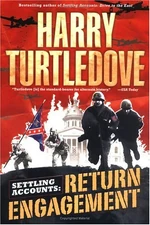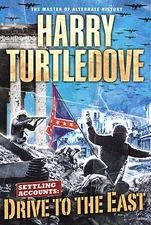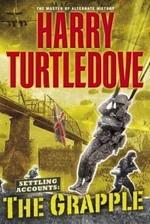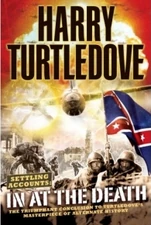This is a list of American electoral candidates for the offices of President of the United States and Vice President of the United States, either duly preselected and nominated, in works of Harry Turtledove that are set in an alternate history or a hypothetical future of OTL.
Democratic Party[]
"Election Day"[]
| Election | Candidate | Running Mate | Won (Y/N?) | ||
|---|---|---|---|---|---|
| 2008 | Barack Obama | 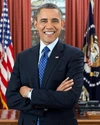
|
Joe Biden (presumed) | 
|
Y |
| 2012 | Y | ||||
| 2016 | John F. Kennedy Jr. | 
|
Michael Bennet | 
|
Y |
Southern Victory[]
| Election | Candidate | Running Mate | Won (Y/N?) | ||
|---|---|---|---|---|---|
| 1864 | Unknown | 
|
Unknown | Y | |
| 1868 | Y | ||||
| 1872 | Y | ||||
| 1876 | Samuel J. Tilden | 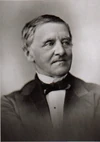
|
Y | ||
| 1880 | N | ||||
| 1888 (presumed) |
Alfred Thayer Mahan | 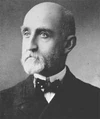
|
Y | ||
| 1892 (presumed) |
Y | ||||
| 1896 (presumed) |
Thomas Reed | 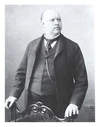
|
Y | ||
| 1900 (presumed) |
Y | ||||
| 1904 |
Unknown | 
|
Y | ||
| 1908 | Y | ||||
| 1912 | Theodore Roosevelt | 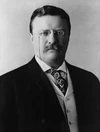
|
Walter McKenna | 
|
Y |
| 1916 | Y | ||||
| 1920 | N | ||||
| 1924 | Unknown | N | |||
| 1928 | Calvin Coolidge | 
|
Unnamed | 
|
N |
| 1932 | Herbert Hoover | 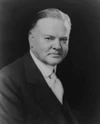
|
Y | ||
| 1936 | Herbert Hoover | 
|
William Borah | 
|
N |
| 1940 | Robert Taft | 
|
Unnamed | 
|
N |
| 1944 | Thomas Dewey | 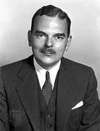
|
Harry Truman | 
|
Y |
Other Nominees[]
In The Guns of the South, Horatio Seymour and Clement Vallandigham are the Democratic ticket in 1864, the only U.S. election described in the novel. The ticket wins.
In both the short story and the novel Joe Steele, the eponymous Joe Steele and John Nance Garner are the Democratic ticket in 1932, 1936, 1940, 1944, 1948 and 1952, and win all of them.
In The War That Came Early, Franklin D. Roosevelt receives the Democratic nomination in 1940, and wins, as he did in OTL. This is the only presidential election depicted in the series. His running mate is unnamed.
In Colonization: Down to Earth, Hubert Humphrey and Joseph P. Kennedy Jr. are the Democratic ticket in 1964, the only election depicted in the series. The ticket loses.
In the State of Jefferson Stories, Jimmy Carter is the incumbent Democratic nominee in 1980, and loses as in OTL. This is the only presidential election depicted in the series. His running mate is unnamed.
Republican Party[]
"The Breaking of Nations"[]
| Election | Candidate | Running Mate | Won (Y/N?) | ||
|---|---|---|---|---|---|
| 2016 | Donald Trump | 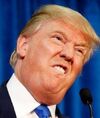
|
Mike Pence | 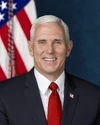
|
Y |
| 2020 | Y | ||||
| 2024 | Mike Pence | 
|
Lindsey Graham | 
|
Y |
| 2028 | Y | ||||
Joe Steele[]
| Election | Candidate | Running Mate | Won (Y/N?) | ||
|---|---|---|---|---|---|
| 1932 | Herbert Hoover | 
|
Charles Curtis (presumed) | N | |
| 1936 | Alf Landon | 
|
Frank Knox | 
|
N |
| 1940 | Wendell Willkie | 
|
Unnamed | N | |
| 1944 | Thomas Dewey | 
|
N | ||
| 1948 | Harold Stassen | 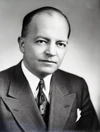
|
N | ||
| 1952 | Robert Taft | 
|
N | ||
In the short story, the Republican Party stopped nominating candidates after 1940.
Southern Victory[]
Known Republican candidates:
 Abraham Lincoln (1860, 1864)
Abraham Lincoln (1860, 1864) James G. Blaine (1880)
James G. Blaine (1880) Wendell Willkie (1940)
Wendell Willkie (1940) Harold Stassen (1944)
Harold Stassen (1944)
The series' only named running mate was Hannibal Hamlin in 1860 and 1864.
Other Nominees[]
In The Guns of the South, the Republican Party fractures during the 1864 election. Abraham Lincoln and Hannibal Hamlin are the establishment-wing ticket. John C. Frémont and Andrew Johnson are the radical wing ticket. Neither win the election.
In The War That Came Early, the Republican Party fractures during the 1940 election. While Wendell Willkie is the nominee for the establishment wing of the party, Alf Landon is the nominee for the isolationist wing. Neither win the election, the only one depicted in the series. No running mates are named.
In Colonization trilogy, Earl Warren and Harold Stassen are the Republican ticket in 1960 and 1964, and win both, although only the 1964 election is depicted within the series.
In the State of Jefferson Stories, Ronald Reagan is the Republican nominee in 1980, and wins as in OTL. This is the only presidential election depicted in the series. His running mate is unnamed.
In "Election Day", Donald Trump is the Republican nominee in 2016 as in OTL. He loses to Democrat John F. Kennedy Jr. Trump's running mate is unnamed.
Socialists and Other Third Parties[]
Southern Victory[]
Throughout the 20th century, the Socialist Party became a viable opposition party to the historically dominant Democrats.
| Election | Candidate | Running Mate | Won (Y/N?) | ||
|---|---|---|---|---|---|
| 1908 | Eugene V. Debs | 
|
Unknown | N | |
| 1912 | N | ||||
| 1916 | N | ||||
| 1920 | Upton Sinclair | 
|
Hosea Blackford | 
|
Y |
| 1924 | Y | ||||
| 1928 | Hosea Blackford | 
|
Hiram Johnson | 
|
Y |
| 1932 | N | ||||
| 1936 | Al Smith | 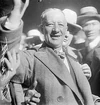
|
Charles W. La Follette | 
|
Y |
| 1940 | Y | ||||
| 1944 | Charles W. La Follette | 
|
Jim Curley | 
|
N |
Other Nominees[]
George McClellan runs as an Independent in the 1864 election in The Guns of the South. He loses, but he does carry two states. His running mate appears to be Edward Everett.
Norman Thomas is the Socialist candidate in 1932 in the novel Joe Steele as he was in OTL. (The short story does not mention him.) His impact on the election appears to be as irrelevant as it was in OTL. He running mate is unnamed. While the novel depicts other elections, the Socialist Party is never mentioned again, nor is any other party beyond the big two.
Gary Johnson is referenced obliquely as the Libertarian Party's candidate in the 2016 election in "Election Day", and is as irrelevant as he was in OTL. His running mate is unnamed.
Historical Nominees In Non-Nominee Roles[]
Several historical POTUS figures from OTL failed to achieve this office in one Harry Turtledove timeline or another; see this page for more details. However, some figures known in OTL as failed POTUS nominees for the Republican Party, the Democratic Party, or some other party, did not even get nominated in a particular alternate history.
While Stephen Douglas' Democratic campaign for POTUS failed in 1860, the matter is irrelevant in both The Two Georges and The Disunited States of America, where the office doesn't exist. However, in the former, he got to hold the quasi-analogous office of Governor-General of the North American Union.
George McClellan was the Democratic nominee in 1864. He appears in his OTL role as a General in How Few Remain; it is never suggested that he ran for POTUS. He is referenced in "Lee at the Alamo" and is still in the Army at the end of the story.
Winfield Scott Hancock, the Democratic nominee in 1880, appears in The Guns of the South in his OTL role as a General. The novel ends before he has had a chance to enter politics.
Benjamin Butler was the nominee of the ad-hoc Greenback-Antimonopoly coalition party in 1884. His role as a General is the focus of his appearance in The Guns of the South and his posthumous reference in "Must and Shall". In How Few Remain, he appears as politician who changes his affiliation from Republican to Democratic in 1882. In neither work is it ever suggested that he sought to be President.
Robert M. La Follette was the Progressive nominee in 1924. In The Great War: Walk in Hell, he is referenced briefly as a Socialist Senator. There is no indication that he ever sought the top seat.
Norman Thomas was the Socialist Party of America's candidate in 1928, 1932, 1936, 1940, 1944, and 1948. In American Empire, a very different Socialist Party of the United States manages to elect a few POTUS. Thomas appears in the guise of "N. Mattoon Thomas" as an Assistant Secretary of War in a Socialist administration, but is not nominated for the top job at any time in the duration of the series.
Strom Thurmond was the States' Rights "Dixiecrat" nominee in 1948. He appears in Settling Accounts: Return Engagement as a Confederate national.
Henry Wallace was the Progressive nominee in 1948. His OTL role as Vice President is relevant to several stories. In Worldwar, he is still VP when he is killed by the Race's explosive-metal bomb in January 1944. In "News From the Front," he is expected to succeed to the Presidency in 1942, upon Congress' expected conviction and removal of FDR. In The Man With the Iron Heart, there is a possibility of his challenging Harry Truman for the Democratic nomination in 1948, but the novel ends before any candidates are chosen.
Adlai Stevenson II was the Democratic nominee in 1952 and 1956. In The Hot War: Armistice, the World War III devastation of America by atomic bombs causes the national election to be postponed from 1952 to 1953. While Stevenson is his party's only contender left standing, the series ends before this status is formalized.
Barry Goldwater was the Republican nominee in 1964. He appears in American Empire: The Victorious Opposition as a Democratic congressman. The series ends shortly after he has reached the minimum age to even consider a presidential run.
Hubert Humphrey was the Democratic nominee in 1968. He appears in The Man With the Iron Heart as the Mayor of Minneapolis, and is referenced obliquely in American Empire: The Victorious Opposition as a pharmacist; both works end before he has had a chance to seek higher office. In The Hot War: Fallout, Humphrey, in his OTL role as a U.S. Senator, is killed during the course of World War III in May 1952. In "The Fillmore Shoggoth," he is actively seeking the 1968 nomination; the story sees an invasion of American territory by Lovecraftian monsters, but it is unclear whether this will have any effect on the election.
Historical Vice Presidential Nominees In Non-Nominee Roles[]
The same strictures as in the previous list apply to this list of historical failed candidates for Vice President who don't even get that far in a Turtledove story. In OTL, the following were members of the Democratic Party, the Republican Party, the Socialist Party of America, or others, and may have their affiliation changed in one story or another.
Frederick Douglass, historian and activist, was the VP nominee of the Equal Rights Party in 1872. This party probably never existed in the world of How Few Remain, where he is a POV character.
George Pendleton was the Democratic VP nominee in 1864. In The Guns of the South, he is not chosen in the analogous election that year, and no more elections are held in the novel.
Franklin D. Roosevelt ran for VP as a Democrat in 1920. In Southern Victory, he appears as a Socialist politician in non-elected offices.
Seymour Stedman was the Socialist VP nominee in 1920. In American Empire: Blood and Iron, he is still a Socialist, and reaches the rank of Speaker of the House, but doesn't run for VP that we know of.
Earl Warren was the Republican VP nominee in 1948. Whether he had a similar position in the context of Colonization is unclear, as the series bypasses the VP question and depicts him as President.
Estes Kefauver was the Democratic VP nominee in 1956. In The Hot War: Fallout, he is in his OTL role as a Senator when he is killed in World War III in 1952.
Henry Cabot Lodge Jr. was the Republican VP nominee in 1960. In the Colonization trilogy, he appears as an Ambassador, but does not run in any elections.
Curtis LeMay was the VP nominee of the American Independent Party in 1968. In the Colonization trilogy, he appears only in his OTL role of a General.
| |||||||||||||||||||||||||||||||||||||||||||||||||||||||||||||||||||||||||||||||||||||||||||||||||||||||||




